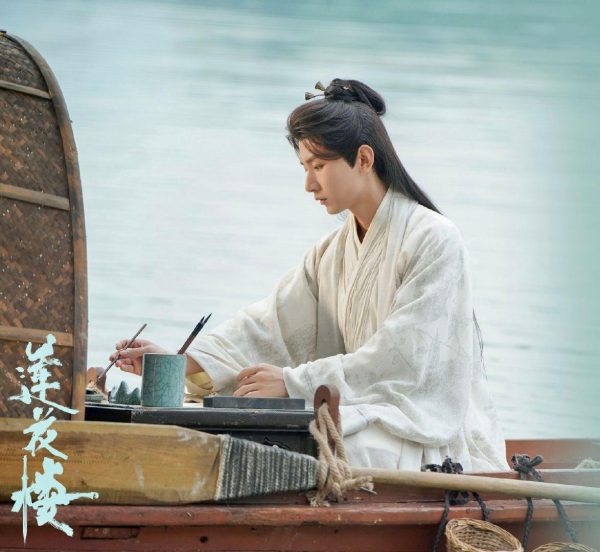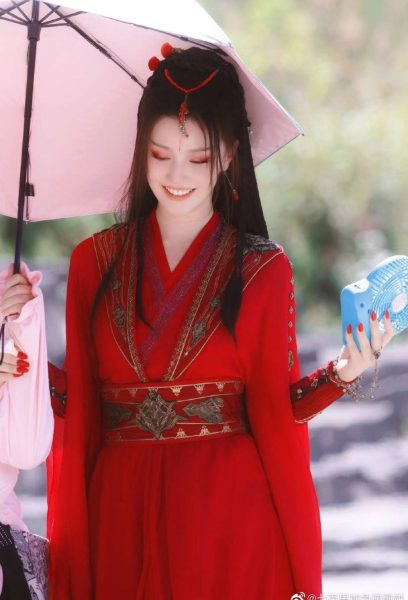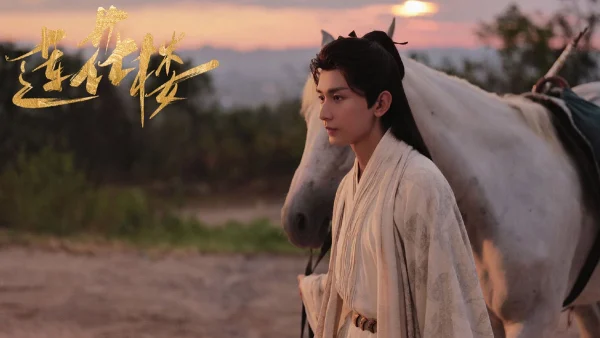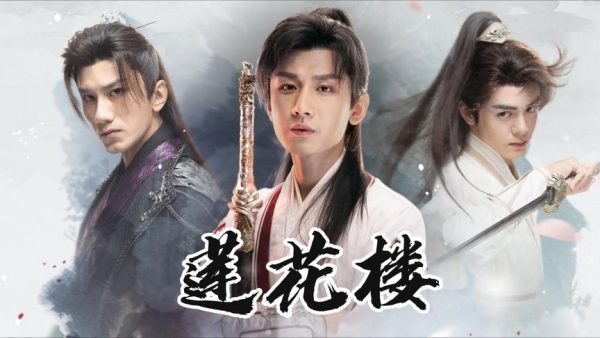While I don’t consider myself a Chinese drama connoisseur by any means—given my ventures into the genre have generally been few and far between, encompassing mostly family recommendations and popular fandoms—my interest in “Mysterious Lotus Casebook” (or 莲花楼) was piqued from the moment that my friend suggested it to me. The premise, she explained, was as such: Li Xiangyi, the leader of the Sigu sect and most skilled in the martial arts world, has been presumed dead for ten years after a battle with the leader of the Jinyuan Alliance, Di Feisheng; in present day, the wandering physician Li Lianhua meets aspiring detective Fang Duobing and becomes involved in—and ends up solving—numerous cases amid the return of the aforementioned Jinyuan Alliance.
Of course, when I began the show, I was instantly hooked. The contrast between Li Xiangyi and Li Lianhua—his present self—was both apparent and compelling. While Li Xiangyi’s prowess with combat was a central point of his reputation and identity, Li Lianhua is instead characterized by his deductive abilities, tendency to fabricate things, and questionable cooking skills. While Li Xiangyi strove for greatness and justice in the martial arts world, Li Lianhua’s only intention with that world is to find the remains of his senior, Shan Gudao. While Li Xiangyi is both idolized and mourned by those who knew him, Li Lianhua is content to hide his identity from his former friends even as he is slowly dying from Bicha poison.
Such a contrast makes the watcher immediately ask how did he end up like this?
The answer to this question is built upon excellently over the course of the show gradually through flashbacks and interactions with other characters. A few moments that really stood out to me in this aspect were conversations that he had with former members of the Sigu Sect: discussing regret, burdens, and young love with his former lover Qiao Wanmian; discussing past mistakes, moving forward, and guilt with Yun Biqiu; and discussing trust, agency, and letting go with Xiao Zijin. It’s evident that Li Lianhua views his former arrogant self as a separate entity, one who has been dead for a decade—he says as much many times in the show. Thus, the recurring theme of moving forward from the past and finding freedom is one that I thought was very well-executed throughout, even when it caused me emotional damage (I swear, whenever characters destroyed/left behind objects that represented past relationships or sentiments, I was devastated). Li Lianhua’s reflection on how he was when he was younger—being blind to how many others truly thought of him, being too proud and arrogant in his ambitions—is something depicted with both complexity and depth.
This brings me to my next point: the character dynamics are wonderful. They would, in all honesty, probably be my favorite part of the show.
 The dynamic between Li Lianhua and Fang Duobing, in particular, is one of the emotional cores and is both entertaining and touching. Fang Duobing, a member of a rich family but seeking to become a Baichuan detective and escaping an arranged marriage with a princess, was once a sickly child (also associated with the fact that his name, Duobing, quite literally means “much illness”) but became determined to try his best to advance his martial arts abilities. Fang Duobing is idealistic. He cares deeply for the people around him, having a strong sense of righteousness. In fact, his ‘first’ interaction with Li Lianhua consists of defending the man in a restaurant.
The dynamic between Li Lianhua and Fang Duobing, in particular, is one of the emotional cores and is both entertaining and touching. Fang Duobing, a member of a rich family but seeking to become a Baichuan detective and escaping an arranged marriage with a princess, was once a sickly child (also associated with the fact that his name, Duobing, quite literally means “much illness”) but became determined to try his best to advance his martial arts abilities. Fang Duobing is idealistic. He cares deeply for the people around him, having a strong sense of righteousness. In fact, his ‘first’ interaction with Li Lianhua consists of defending the man in a restaurant.
I thoroughly enjoyed the conversations between the two of them and how their dynamic progresses throughout the show. Even by the second episode, I found myself emotionally invested in their duo. At the beginning, Li Lianhua has an amusing habit of ditching Fang Duobing on the side of the road (much to Fang Duobing’s dismay). He is eventually dragged into helping Fang Duobing solve cases for various reasons, including but not limited to 1) trying not to be suspected of murder, 2) trying not to be discovered by a group of criminals and 3) trying to save Fang Duobing’s life. He runs into Fang Duobing by accident in nearly every arc and it never stops being entertaining. I particularly love their duo dynamic while solving cases—with Li Lianhua noticing clues and Fang Duobing following his train of thought, employing his own knowledge too—as well as how they use their various reputations to get in and out of situations. (There’s one instance where Fang Duobing flips his hair and says dramatically, “I’m a detective of the Baichuan Academy, Fang Duobing.”) In addition, Fang Duobing’s commentary (criticism) of Li Lianhua’s cooking and his enthusiasm in contrast to Li Lianhua’s calmness are all delights to watch.
Fang Duobing also happens to be related to Shan Gudao—because of that, he encountered Li Xiangyi once in the past, becoming inspired to work hard to achieve the level of martial arts ability he now has. Demonstrably, he looks up to Li Xiangyi, but he also sees him as not just a heroic figure but also as a person. For example, he remembers from his encounter how Li Xiangyi had enjoyed eating candy despite his impressive reputation, so Fang Duobing subsequently leaves pieces of candy next to the portrait of Li Xiangyi. Also, when Li Lianhua is slandering himself in the 19th episode—saying how Li Xiangyi was much too arrogant—Fang Duobing says he recognizes Li Xiangyi’s arrogance but also shows how he understands that Li Xiangyi had faith in a better martial arts world. He genuinely is someone who understands Li Xiangyi beyond his reputation. Even after realizing who Li Lianhua is (and being understandably upset about having not been told about it) Fang Duobing still cares about the health of Li Lianhua—not just Li Xiangyi, the person he used to be—and makes personal sacrifices for his sake. He and Li Lianhua have saved each other’s lives more times than I can count in the show. Their development from complete strangers to genuine friends is so heartwarming!
Another dynamic I loved was the rivalry/former enemies dynamic of Li Lianhua and Di Feisheng. Beginning the show as enemies and eventually becoming close as well, the two of them had strong narrative parallels and I adored their differences in viewpoints. They both were the leaders of powerful sects within the martial arts world; they both were incredibly powerful but they irrevocably changed each other’s lives during their fight at the East Sea. Specifically, I found it so entertaining how nonchalant Li Lianhua was while being threatened by Di Feisheng—instead of wanting a rematch while facing his opponent for the first time in a decade, Li Lianhua instead talks about the difficulties of learning how to cook. In contrast, Di Feisheng is pretty much obsessed with a rematch against Li Lianhua, declaring that Li Xiangyi is his only rival and going so far as to spend so much of his efforts looking for a way to cure Li Lianhua of the poison afflicting him in order to have it.
 Di Feisheng even seems to care more about Li Lianhua’s well-being than he does the Jinyuan Alliance, of which he is the leader. He is willing to continue to lie on Li Lianhua’s behalf; when he himself has been attacked and is nearly unconscious, the person he tells himself to find is Li Lianhua. The dynamic between the two of them is well-crafted and provides more depth to both of the characters. One comparison I really loved with their respective skill sets was Di Feisheng’s ‘Windy Poplar’ versus Li Lianhua’s ‘Yangzhouman’—the former ‘seeks survival in dangerous situations’, reflecting Di Feisheng’s struggle to survive in his childhood as he was forced to fight and kill, while the latter is ‘proper and long-lasting’, reflecting Li Xiangyi’s strength and faith.
Di Feisheng even seems to care more about Li Lianhua’s well-being than he does the Jinyuan Alliance, of which he is the leader. He is willing to continue to lie on Li Lianhua’s behalf; when he himself has been attacked and is nearly unconscious, the person he tells himself to find is Li Lianhua. The dynamic between the two of them is well-crafted and provides more depth to both of the characters. One comparison I really loved with their respective skill sets was Di Feisheng’s ‘Windy Poplar’ versus Li Lianhua’s ‘Yangzhouman’—the former ‘seeks survival in dangerous situations’, reflecting Di Feisheng’s struggle to survive in his childhood as he was forced to fight and kill, while the latter is ‘proper and long-lasting’, reflecting Li Xiangyi’s strength and faith.
Not to mention that the three of them together—Li Lianhua, Fang Duobing and Di Feisheng—provide the absolute most hilariously chaotic dynamics yet function so nicely as a team! It’s worth noting that Fang Duobing, completely unaware of both Li Lianhua and Di Feisheng’s true identities for a large chunk of the show, is perpetually perplexed by the things that they seem to know and he doesn’t—he also is so protective over Li Lianhua that he warns him against Di Feisheng due to Di Feisheng’s admittedly very suspicious behavior. Some of my favorite moments of the trio are, first of all, when they begin to work together: Fang Duobing and Di Feisheng are always bickering and antagonizing each other, with Li Lianhua tiredly attempting to keep the peace and prevent property destruction.
Later on, I appreciate how well they all work together despite sharing one brain cell between the three of them (such as when, upon being asked the same question, they simultaneously say three different answers). I was honestly so invested in their individual dynamics and group dynamics; I loved how those interactions were all so different and refreshing, as well as how the development of those dynamics progressed in each subsequent case. All of the shenanigans they get caught up in are fantastic in their own right.
The emotional moments between the characters, too, were incredibly compelling. I can’t talk about them too much because that would venture a bit too far into spoiler territory, but I loved seeing the evolution of Li Lianhua’s perception of Shan Gudao and the emotional suffering that Li Lianhua experiences as a result—especially when he realizes what Shan Gudao’s opinion of him really was. The fallout of the identity reveal between Li Lianhua and Fang Duobing was something that also personally wounded me and had me rambling at the TV, but was everything that I had hoped for in the scene! The bittersweet nature of the closure Li Lianhua received with people from his past was perfect as well. Again, thematically, the profundity and maturity through which Mysterious Lotus Casebook explored the topics of moving on from the past, freedom, forgiveness, idealization and the death of one’s former self was something I thought to be especially well-handled.
 The humor is also top-notch. The comedic timing is so on point, with each of the actors doing such a great job in delivering their lines. I swear, I was left laughing at so many aspects due to both the unending scenes of dramatic irony. One part that comes to mind is all the times that Fang Duobing and Li Lianhua have conversations about Li Xiangyi while Fang Duobing has no idea who Li Lianhua really is (including moments such as: saying how he only met Li Xiangyi once, while quite literally sitting next to him; saying that he trusts that Li Xiangyi is still somewhere out there, while quite literally sitting next to him; wondering whether Li Xiangyi has adopted a fake name and survived, while quite literally sitting next to him).
The humor is also top-notch. The comedic timing is so on point, with each of the actors doing such a great job in delivering their lines. I swear, I was left laughing at so many aspects due to both the unending scenes of dramatic irony. One part that comes to mind is all the times that Fang Duobing and Li Lianhua have conversations about Li Xiangyi while Fang Duobing has no idea who Li Lianhua really is (including moments such as: saying how he only met Li Xiangyi once, while quite literally sitting next to him; saying that he trusts that Li Xiangyi is still somewhere out there, while quite literally sitting next to him; wondering whether Li Xiangyi has adopted a fake name and survived, while quite literally sitting next to him).
I, of course, also have to mention a part in the show that had me solidly laughing for several minutes straight: when Fang Duobing’s mother tells Li Lianhua that she’s happy he doesn’t participate in sect conflict and is instead a free-spirited wanderer, unlike Fang Duobing’s past subject of admiration, Li Xiangyi, whom she dislikes. Meanwhile, both Li Lianhua and Fang Duobing, who at that point in the show is aware who Li Lianhua really is, sit there awkwardly. When Di Feisheng is added into the mix, this dramatic irony only increases, making for some very amusing and rewatchable moments.
Li Lianhua’s tendencies to lie are also very, very enjoyable and make him an appealing protagonist. To avoid admitting that he’s teaching Fang Duobing his famous ability titled Yangzhouman (the name being composed of place in China and the word ‘slow’) he instead says that it is titled Suzhoukuai (an entirely different place in China and the word ‘fast’). Honestly, it seems like he and Fang Duobing are on the same wavelength, considering Fang Duobing (square, much illness) once assumed the fake name ‘Yuan Jiankang’ (circle, healthy). Li Lianhua constantly feigns ignorance. At one point, while being suspected of being Li Xiangyi by his former friends, Li Lianhua completely makes up having a twin brother. He lies about not having received a letter that in reality he burned a few episodes before; he lies about falling off a cliff and seeing a fairy godmother; he lies to Di Feisheng about the nature of their relationship; he lies about being a famous grave robber; so on and so forth. In fact, he lies so much that Fang Duobing remarks on it too. It’s one of my favorite aspects of the show, particularly when the audience is well aware of how egregiously deceptive he’s being.
The plot, too, pulled me along (with enthusiasm!) every step of the way.
Each case is so engaging, being both self-contained and tied to the larger narrative. They range all the way from murder mysteries at an inn to the search for a disappeared building from a hundred years ago. Each case contains unique new characters with their own personal histories and relationships with each other, which Li Lianhua, Fang Duobing and occasionally Di Feisheng uncover the nature of. The watcher is also given hints at a lot of the important clues, making it so that we can follow and suspect things as well! It’s so satisfying seeing all the pieces fall into place during each of the cases—and equally satisfying hearing Li Lianhua explaining how everything connects, in a way that makes me go “ohhhh” every time. Many of the lessons learned through the resolutions of the cases also provide insight on the main characters. As a whole, the mystery aspect really lives up to the premise.
One aspect of the show I admire as someone who’s always been into fashion is the costuming—more specifically, the color palettes and designs of each character and how that connects to their arcs as a whole. Li Xiangyi appears on screen in bright reds and whites, with the structures of his sleeves indicating martial arts experience and his high ponytail being demonstrative of the kind of young pridefulness he embodies. It’s clear that, as Qiao Wanmian once put it, Li Xiangyi is “bright and dazzling as the sun”. Li Lianhua, on the other hand, dresses mostly in muted, calm colors with very little ornamentation, often found in whites, blues, and greens. It’s nearly the exact opposite of how Li Xiangyi dresses. It reflects the kind of simple, free life that he has lived since the battle ten years ago and his lack of interest in returning to the martial arts world. Fang Duobing, the son of a minister and engaged to a member of the royal family, dresses in generally bright, smooth and structured clothes that show both his wealth and his skill at martial arts (for example, by his hairpiece and the detail on the fabric). Di Feisheng is usually in dark colors with a lot of metal ornamentation but not the wealthy flourishes Fang Duobing has. This combination makes him seem like quite the intimidating figure. It’s impressive how fitting each character’s wardrobe is to their identity!
 All in all, I would wholeheartedly recommend this drama. I literally could not tear my eyes away from the screen until I had finished all 40 of the episodes. The characters are all so three-dimensional and complex, the interactions between them are compelling and entertaining, the plot and its plot twists build up well for the audience and left me on the edge of my seat—and there were so many times that I was either wheezing from laughter or tearing up.
All in all, I would wholeheartedly recommend this drama. I literally could not tear my eyes away from the screen until I had finished all 40 of the episodes. The characters are all so three-dimensional and complex, the interactions between them are compelling and entertaining, the plot and its plot twists build up well for the audience and left me on the edge of my seat—and there were so many times that I was either wheezing from laughter or tearing up.
To everyone who is looking for something new to watch, whether you’re experienced with the wuxia genre and other Chinese media or not, please check out Mysterious Lotus Casebook. I promise you won’t regret it!
On this blog, members of the Carmel High School chapter of the Quill and Scroll International Honorary Society for High School Journalists (and the occasional guest writer) produce curations of all facets of popular culture, from TV shows to music to novels to technology. We hope our readers always leave with something new to muse over. Click here to read more from MUSE.

































![AI in films like "The Brutalist" is convenient, but shouldn’t take priority [opinion]](https://hilite.org/wp-content/uploads/2025/02/catherine-cover-1200x471.jpg)








































![Review: “The Immortal Soul Salvage Yard:” A criminally underrated poetry collection [MUSE]](https://hilite.org/wp-content/uploads/2025/03/71cju6TvqmL._AC_UF10001000_QL80_.jpg)
![Review: "Dog Man" is Unapologetically Chaotic [MUSE]](https://hilite.org/wp-content/uploads/2025/03/dogman-1200x700.jpg)
![Review: "Ne Zha 2": The WeChat family reunion I didn’t know I needed [MUSE]](https://hilite.org/wp-content/uploads/2025/03/unnamed-4.png)
![Review in Print: Maripaz Villar brings a delightfully unique style to the world of WEBTOON [MUSE]](https://hilite.org/wp-content/uploads/2023/12/maripazcover-1200x960.jpg)
![Review: “The Sword of Kaigen” is a masterpiece [MUSE]](https://hilite.org/wp-content/uploads/2023/11/Screenshot-2023-11-26-201051.png)
![Review: Gateron Oil Kings, great linear switches, okay price [MUSE]](https://hilite.org/wp-content/uploads/2023/11/Screenshot-2023-11-26-200553.png)
![Review: “A Haunting in Venice” is a significant improvement from other Agatha Christie adaptations [MUSE]](https://hilite.org/wp-content/uploads/2023/11/e7ee2938a6d422669771bce6d8088521.jpg)
![Review: A Thanksgiving story from elementary school, still just as interesting [MUSE]](https://hilite.org/wp-content/uploads/2023/11/Screenshot-2023-11-26-195514-987x1200.png)
![Review: "When I Fly Towards You", cute, uplifting youth drama [MUSE]](https://hilite.org/wp-content/uploads/2023/09/When-I-Fly-Towards-You-Chinese-drama.png)
![Postcards from Muse: Hawaii Travel Diary [MUSE]](https://hilite.org/wp-content/uploads/2023/09/My-project-1-1200x1200.jpg)
![Review: "Ladybug & Cat Noir: The Movie," departure from original show [MUSE]](https://hilite.org/wp-content/uploads/2023/09/Ladybug__Cat_Noir_-_The_Movie_poster.jpg)
![Review in Print: "Hidden Love" is the cute, uplifting drama everyone needs [MUSE]](https://hilite.org/wp-content/uploads/2023/09/hiddenlovecover-e1693597208225-1030x1200.png)
![Review in Print: "Heartstopper" is the heartwarming queer romance we all need [MUSE]](https://hilite.org/wp-content/uploads/2023/08/museheartstoppercover-1200x654.png)




![Review: “Mysterious Lotus Casebook” is an amazing historical Chinese drama [MUSE]](https://hilite.org/wp-content/uploads/2024/03/0.webp)